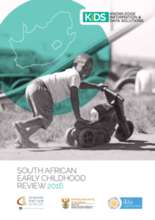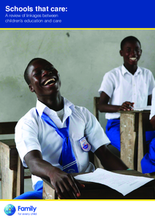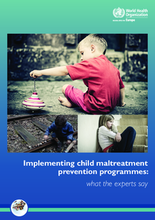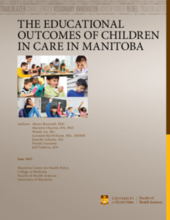Displaying 211 - 220 of 349
This study explores the association of caregiver and child characteristics with educational outcomes for orphaned and abandoned children (OAC) in India.
This study was carried out in rural Arkansas to examine the feasibility and usefulness of a universal screening tool--the Family Map Inventory (FMI)--to assess family strengths and needs in a home visiting program.
This report reviews South Africa’s National Integrated Early Childhood Development Policy, which was approved by the Cabinet in December 2015. The policy is aimed at providing a framework for multi-sectoral Early Childhood Development services in South Africa.
This report presents the key findings of a scoping study on the links between education and children’s care. The study involved a literature review in English, French and Spanish; key informant interviews; and consultations with 170 children, carers, teachers and other stakeholders in Guyana, India, Russia and Rwanda.
This handbook authored by the World Health Organization Europe and Liverpool John Moores University – based on a series of interviews with the world's leading experts on preventing child maltreatment – provides practical information to policy-makers, practitioners and others on implementing prevention programmes. The handbook describes key principles for selecting and delivering programmes, and important practical considerations, including resources and technical support.
This webinar from Faith to Action Initiative presents key strategies for expanding the capacity of families to care for orphans and vulnerable children.
This study was designed to evaluate the effectiveness of a family-level economic strengthening intervention with regard to school attendance, school grades, and self-esteem in AIDS-orphaned adolescents aged 12-16 years from 10 public rural primary schools in southern Uganda.
This article reports on the Western Uganda Bantwana Program, which worked with more than 1,000 HIV/AIDS-affected families with the goals of improving socioeconomic status, psychosocial functioning, and educational participation.
This study was designed to “identify factors that contribute to the educational success of children in care in Manitoba” and to “make recommendations regarding what schools, school divisions, and the provincial Department of Education and Advanced Learning could do to contribute further to the educational success of children in care.”
In this executive summary, the Truth and Reconciliation Commission of Canada provides an introduction to the use of residential schools for aboriginal children in Canada, presents an overview of the Commission’s activities, describes the history and legacy of these residential schools, and outlines the challenges of reconciliation, including 94 recommendations, or “calls to action” for reconciliation in the field of Child Welfare among many others.




